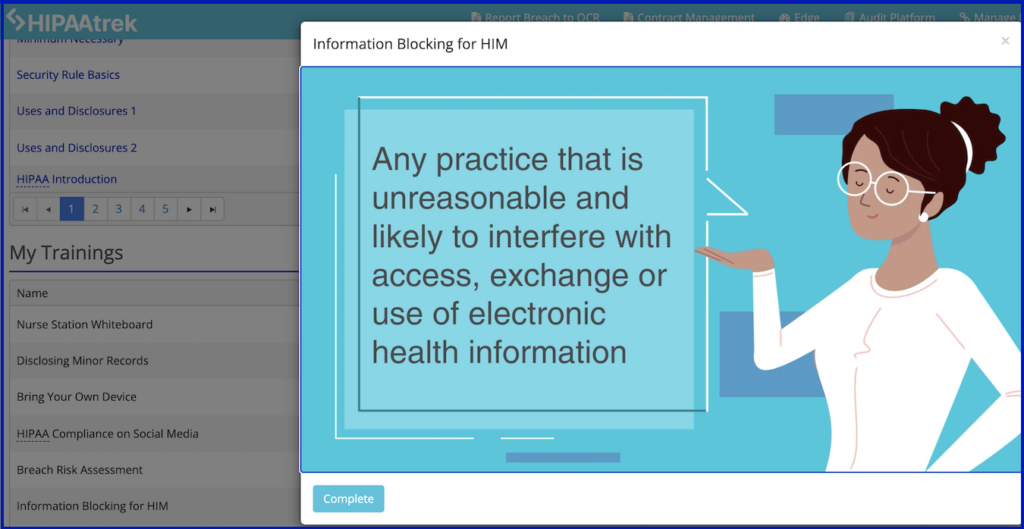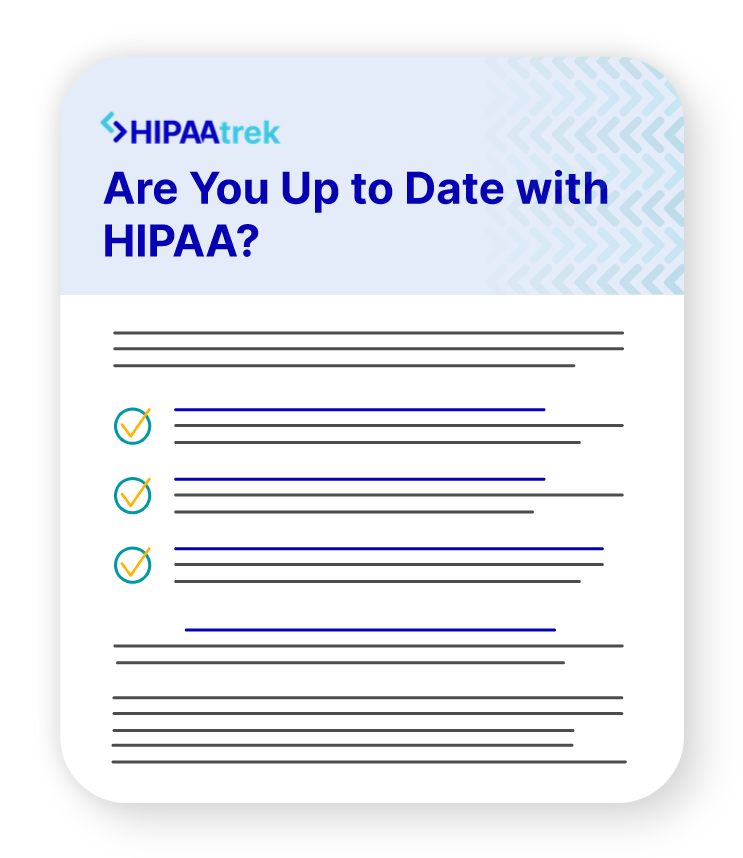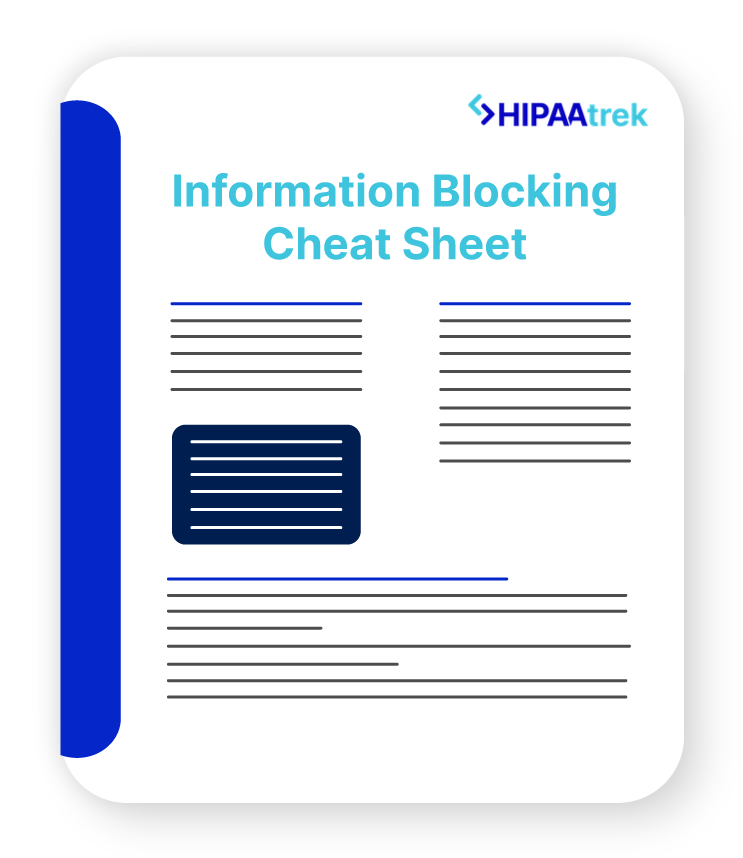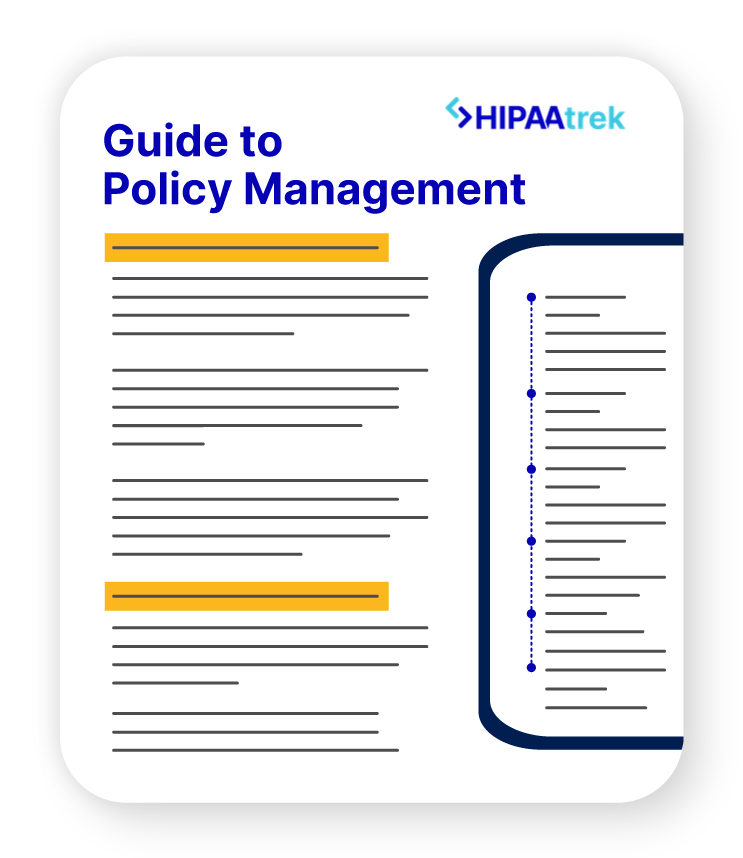HIPAA training may immediately conjure images of bored staff, slogging through the annual training videos to check a box and move on with their job. But training is key to creating compliance in action, so it is critical to think beyond the requirements and implement training that is specific, efficient, and yes, even fun!
HIPAA compliance involves many different tasks—policy management, contract management, breach and incident reporting—but the step that makes the biggest difference in creating compliance day-to-day is HIPAA compliance training. That’s why today, we’re diving into what HIPAA has to say about training, along with some best practices to help you effectively train your team.
HIPAA Training Requirements
Consistent and effective training is about so much more than meeting HIPAA requirements—HIPAA is a civil right, and members of your team have a responsibility to protect PHI.
That said, getting clear on what HIPAA has to say about training helps to ensure that you are at least meeting minimum requirements. Just keep in mind that insufficient training is an organizational risk, so you may need to go above and beyond to have a properly trained team.
Both the HIPAA Privacy Rule1 and Security Rule2 outline HIPAA training requirements, related specifically to each Rule. The Rules outline requirements related to security reminders, training on the handling of PHI, and documentation of this training.
Nearly every Corrective Action Plan cites insufficient training as a HIPAA compliance deficiency, so starting with the regulations is a good foundation.
How often is HIPAA Training Required?
While most of us assume that HIPAA has a requirement for annual training, when you review the regulations, it is not so clear.
The Privacy Rule states that new hires need to be trained on the proper handling of PHI within a “reasonable period of time” after joining an organization. Additionally, employees need to be trained when their job functions are impacted by a change in policies and procedures. Security reminders are also expected to be sent periodically.
That said, the best practice for HIPAA training is to train as needed for your specific organization—not just an annual requirement to check a box.
Security reminders and regular assigned training alike should be distributed as frequently as your organization requires. Making training an ongoing part of regular operations ensures the team retains information, keeping it top-of-mind and much more effective. Security reminders and privacy training should also be tailored to critical issues as they come up, correcting risky actions quickly, before they become ingrained habits.
Also keep in mind that HIPAA training is more than just training videos and security reminders–HIPAA also has a requirement that all staff have access to your policies and procedures.
Topics to Cover During HIPAA training
When establishing your HIPAA training topics, remember that generic, high-level training is simply not effective.
HIPAA training is required to be specific, both to your organization and to the role being performed. Just as a dishwasher and a chef require different training to work in a kitchen, the different members of your team require training specific to their role and the PHI they will encounter.
At HIPAAtrek, for instance, we don’t just have a single video training on Uses and Disclosures of PHI, but we have tailored videos for Providers or HIM team members. Keeping videos focused on a specific function also allows us to keep them short, engaging, and relevant in the face of short attention spans and distractions. Click here to learn more about HIPAAtrek.

According to the HIPAA Privacy Rule, you need to train specifically on your policies and procedures, and you need to re-train staff when policies and procedures change. We suggest training focused on real-life scenarios and role-playing, so employees can grasp the practical implications of policies.
Documenting HIPAA Training
It’s not enough to train your team, though—if it isn’t documented, it may as well not have happened!
Documentation of HIPAA training is critical so that you can prove compliance, remaining ready in case of audits or investigations by the Office for Civil Rights (OCR). Training documentation is critical to show that you are doing your part to ensure team members know how to protect PHI.
In case of an audit, the OCR will look for documentation including:
- The name of the training,
- A description of what the training was covered,
- The date the training was completed, and
- Who took the training, including authentication for each person completing training.
Note: in the HIPAAtrek platform, we use a time and date stamp that functions as electronic authentication.
What are the Consequences of Not Training on HIPAA?
Now that you know what HIPAA says about training, you might be wondering: what happens if we don’t train on HIPAA?
Of course, it’s not the type of offense that will immediately result in scary investigations and hefty fines. But not properly training on HIPAA can still have huge repercussions for your organization, your patients, and your team.
First, if you do not properly train on your policies and procedures, your staff cannot be expected to comply with them, which makes it challenging to hold them accountable. Ultimately, if they don’t know how to protect PHI, it is your responsibility for not providing sufficient training.
Insufficient training also leaves your organization vulnerable to a privacy or security breach, since your staff doesn’t know how to properly protect PHI. That breach could also put you at risk of being investigated by the OCR. And, if the OCR does investigate, one of the first things they will ask for is evidence of training.
Missing proper documentation of training that addresses the cause of the breach could increase the costs associated with the investigation—up to and including a civil monetary penalty (a fine from the OCR).
Ultimately, inadequate training can be a big risk to your patient data, your team, and your organization as a whole.
Supporting HIPAA Training
Even though HIPAA training is critical, that doesn’t mean it needs to be boring—in fact, quite the opposite! It is important to support and supplement HIPAA training with engaging options whenever possible. Training that is fun is training that is retained—and put into action.
Consider which training can be gamified or supported by tools like crossword puzzles or treasure hunts for potential vulnerabilities.
Additionally, don’t discount posters! Posters allow a consistent reinforcement of important HIPAA training, like processes for records requests or cybersecurity procedures.
Place posters anywhere your team has an extra minute to fill—like the break room, or even the bathroom. Keeping posters funny or entertaining can not only make them more likely to be read, but likely to be retained as well—people remember things when they’re entertained.
At HIPAAtrek, we provide HIPAA training posters, crossword puzzles, and games as a supplement to our automated training and security reminder systems in the HIPAAtrek platform.
HIPAA Training for Employees
Training your team on HIPAA is critical to creating compliance in action across your organization. It’s great to have policies in place, but if your staff isn’t trained to implement them, does it really matter?
Effective HIPAA training isn’t just about reading policies—it’s about being sure each team member understands their role and responsibilities when it comes to protecting PHI. By implementing training that is specific, efficient, and yes, even fun, you can create HIPAA training that truly protects your organization.
HIPAAtrek was built by HIPAA experts to ease the hurdles of compliance—including supporting training your team. Our built-in training videos are short, engaging, and role-specific, with accompanying optional quizzes, so it’s simple to assign training and track completion. Plus, automated security reminders in the HIPAAtrek platform mean one less thing on your to-do list, and our policies module even allows you to assign policies to team members for review.
Ready to streamline your training program?
Schedule a demo to learn more about HIPAAtrek and our training module.
—













